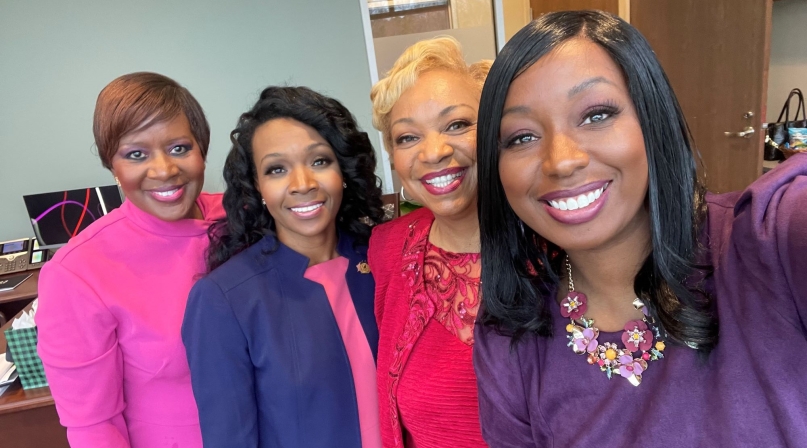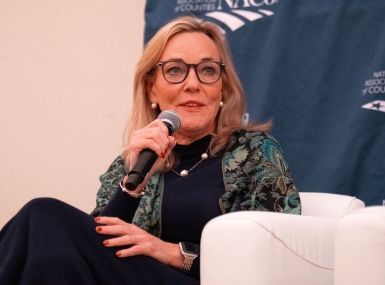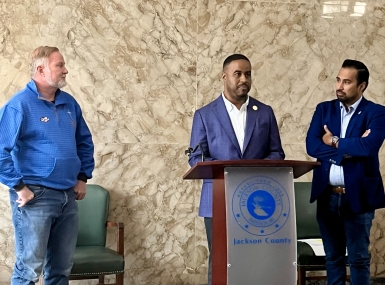Making history: Black women lead Georgia urban counties

Starting in January, Black women will be at the helm of five counties in the Atlanta metro area — all of which, a decade ago, had never elected a Black female chair.
Three of the Black female chairs — Cobb County Chair Lisa Cupid, Henry County Chair Carlotta Harrell and Gwinnett County Chair Nicole Hendrickson — were elected in 2020, amid a pandemic and social upheaval.
“It was evident that people were craving change,” Hendrickson said. “They were craving leadership that demonstrated compassion and commitment for community.”
After being sworn in as chair, Hendrickson announced, “We’re going to be a Gwinnett that’s for everyone, that represents people from all walks of life.” A Jewish rabbi, Islamic imam and Christian preacher offered prayers at the ceremony, and Hendrickson invited prominent voices in Gwinnett County’s Latino and Asian-American communities to speak.
Diversity — not just in gender and race, but also in thought and lived experience — leads to a stronger county commission, because it more fully represents the population it’s serving, Hendrickson said.
Before becoming county chair, Hendrickson served as associate director of the Gwinnett Coalition for Health and Human Services and led the Gwinnett County Community Outreach Division, which gives underrepresented communities the opportunity to be more involved with local government and provide feedback on policies. Those roles, along with her career as a social worker and personal experience with housing and food insecurity as a child, have all informed Hendrickson’s leadership, she said.
“At the end of the day, we are in the business of service delivery, but we’re also in the business of the human welfare of our communities,” she noted. “… It goes back to the saying ‘A rising tide lifts all boats.’ You want to make sure that the ‘least’ of us has everything they need to survive and thrive, and when they do, that’s a benefit to everybody in the community.”
Hendrickson is the first Black person and woman of color to serve as chair in Gwinnett, the most racially diverse county in Georgia. Being “first” comes with a lot of pressure and can feel like a burden, she said, albeit a positive one that she is happy to bear, knowing that she’s helping “lay the foundation for somebody who picks up that torch after [her],” she added.
“I didn’t run to be the first, I ran to make change,” she said. “But being the first is a heavy weight. Not only is it very lonely being in a top leadership position, because there are so few of us, but you are expected to alleviate the burden of all Black people in the history of civil rights. It’s a heavy lift, and people expect you to deliver the ‘promised land’ overnight.
“… And being the first [Black chair], I have to also be the person who gets all of the front-facing daggers — the criticism, the looks, the vitriol that comes my way. ‘You don’t deserve to be in this seat,’ ‘You’re a DEI candidate,’ ‘You’re only about racial politics,’ and nothing could be further from the truth.”
Harrell and Cupid have also faced harassment surrounding their identity as Black female government officials; in 2021, Harrell was granted a stalking protective order against a woman who had repeatedly harassed her on social media and in 2015, when Cupid was a county commissioner, she was followed and racially profiled by a Cobb County police officer in an undercover vehicle.
Cupid shared her story publicly and called for a review of the police department’s policies, a situation that initially caused local backlash for her. However, the county has since created a Real-Time Crime Center that “targets the criminal instead of criminalizing communities,” Cupid said. The center takes video footage and uses technology to pinpoint specific details, such as whether a car has a particular dent in it or if the suspect is wearing a specific brand of shirt, instead of relying on a broad suspect description, which often includes race and can lead to profiling.
“I can’t express in the amount of time that we have just how difficult of an experience that was for me and for my family,” Cupid said. “What I can tell you is that I have seen paradigmatic shifts within our police department to be more community facing and to be sensitive to the unique experiences that people of color have in interacting with the police.”
Prior to serving in Henry County government, Harrell was a police lieutenant and spent 20 years in law enforcement. It’s important, particularly in local government where it can sometimes be overlooked or underfunded, to invest in public safety and make sure that officers are properly trained and engaged with the community, she said.
“Public safety is here to serve the community,” Harrell said. “…There’ve been so many incidents nationally, and we always see what law enforcement is not doing right, but we never see the 99 times that they get it right.
“I’m real big on community policing and being in the community, so that the community can get to know their law enforcement officers and firefighters. You have to make sure that everyone is working together, and I think that builds that sense of trust within the community, so that way, if something happens, they’re not hesitant about picking up the phone and reporting it.”
Harrell’s time as a police officer and her family (her parents were civil rights freedom fighters and her father was a pastor) have shown her how essential community is, which is why she’s in local government, she said.
Harrell is Henry County’s second Black female chair — the first, June Wood, was elected in 2016. Wood “opened doors for people to look at the fact that Black women can lead,” in Henry County, Harrell said. While Harrell is a Democrat and Wood is a Republican, Harrell values Wood’s opinion and experience, and she reaches out to her for input, she said. The two also “connect quite often” with B.J. Mathis, Henry County’s first female chair, who is white and a Republican.
“Being able to do that regardless of the party [is important],” Harrell said. “For them, it was about service. For me, it’s about service. It’s not about party, it’s not about the politics, it’s about how we can serve the community.”
As Black female chairs in neighboring counties, Cupid, Harrell and Hendrickson have all become close and often call each other up to bounce ideas off one another, Harrell said. All three women expressed gratefulness for the support system they’ve found in each other.
“We were able to create and develop this bond, and we continue to support one another,” Harrell said. “For women in leadership — Black, white, or whatever — I think it’s important that women support women.
“We know that if we might need advice or an opinion, ‘What are you doing over here in Cobb County for this situation?’ ‘What are you doing in Gwinnett County for this situation?’ We can reach out to one another and have those genuine conversations.”
While there are things the three discuss that they could talk about with any other chair, Cupid acknowledged, the fact they are all Black women allows them to be more comfortable being open with each other about vulnerabilities, as well as ambition, she said.
“It creates an immediate safe space and no judgment zone, as we each are going into this new territory,” Cupid said. “… We are a supportive network for each other at the beginning and end of the day.”
In January, two more counties in the Atlanta metro area — Clayton and DeKalb — will be led by Black women for the first time — Alieka Anderson and Lorraine Cochran-Johnson, respectively. Cupid, Harrell and Hendrickson have made a commitment to extend their close bond and support to the two women, Cupid said.
“It’s my hope that they know that they do not need to enter this territory alone,” Cupid said. “And that there are other women around them who are proud of them, who champion them and are here to support them.”
Related News

LUCC members hear challenges, solutions to disasters
Disasters require coordinated, multi-level responses that support the long-term resilience of urban counties.

Jackson County chair combines diverse experiences for effective leadership
A fellowship funded by the Congressional Black Caucus kick-started DaRon McGee’s career in public service, but his promise to his mother brought him back to Jackson County, Mo., where he's made his name.

Accepting criticism can help improve results, Howard County executive says
Calvin Ball recognizes that any election results show elected officials probably don’t have universal approval, and winning over critics can lead to better overall communication with all residents.
County News
County leaders join effort to recognize national service
![AmeriCorps Member Tutoring[1] (1).jpg Image of AmeriCorps Member Tutoring[1] (1).jpg](https://www.naco.org/sites/default/files/styles/667x579/public/articles/AmeriCorps%20Member%20Tutoring%5B1%5D%20%281%29.jpg?h=b09200d3&itok=FPaIojGO)
